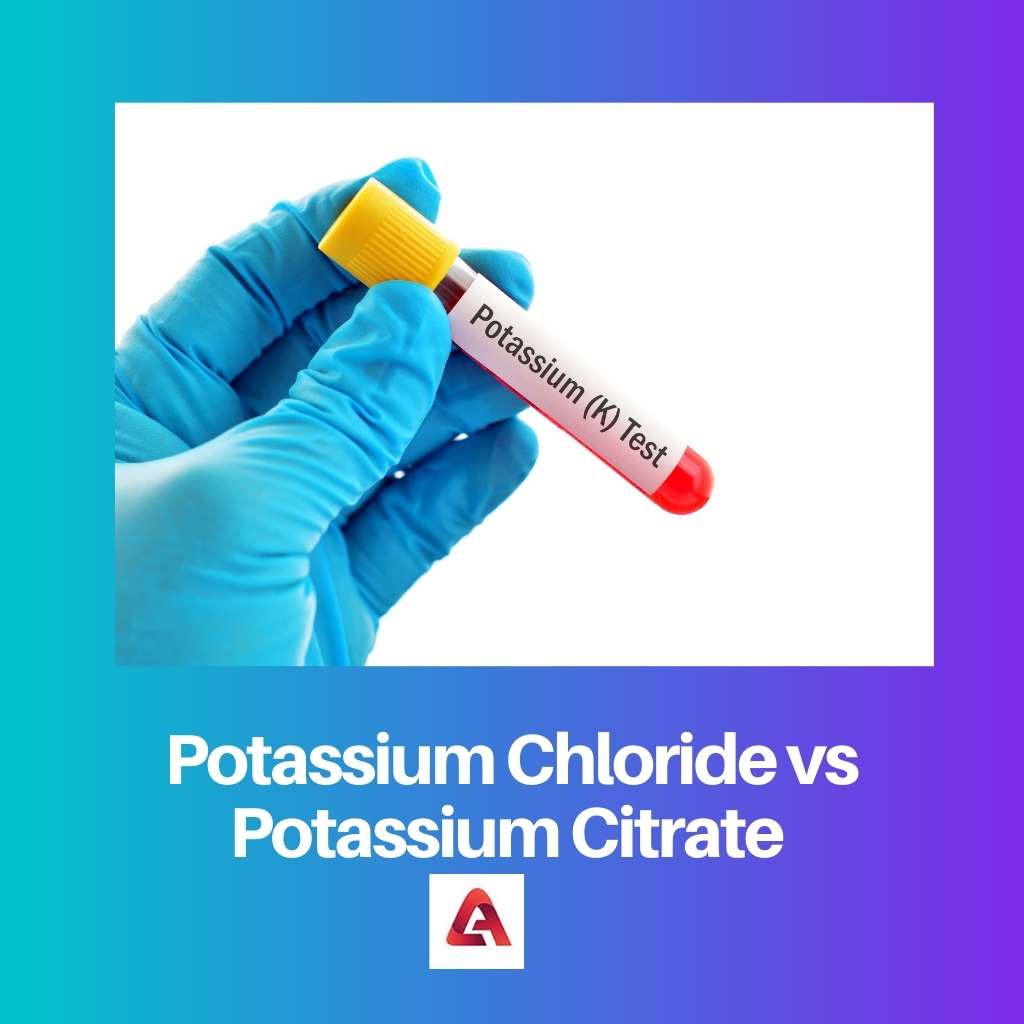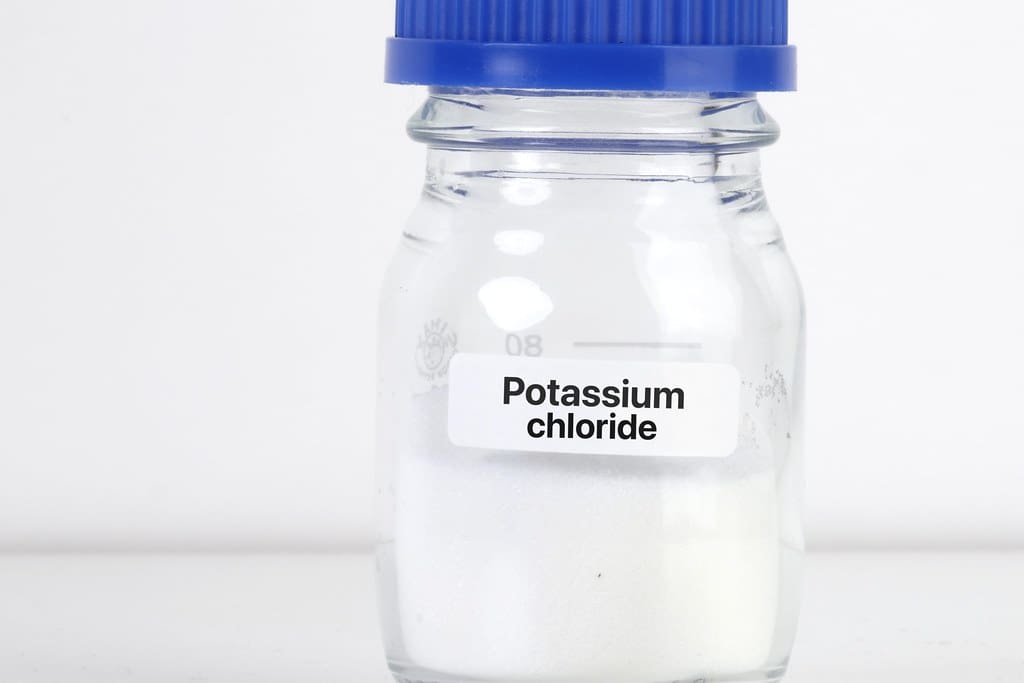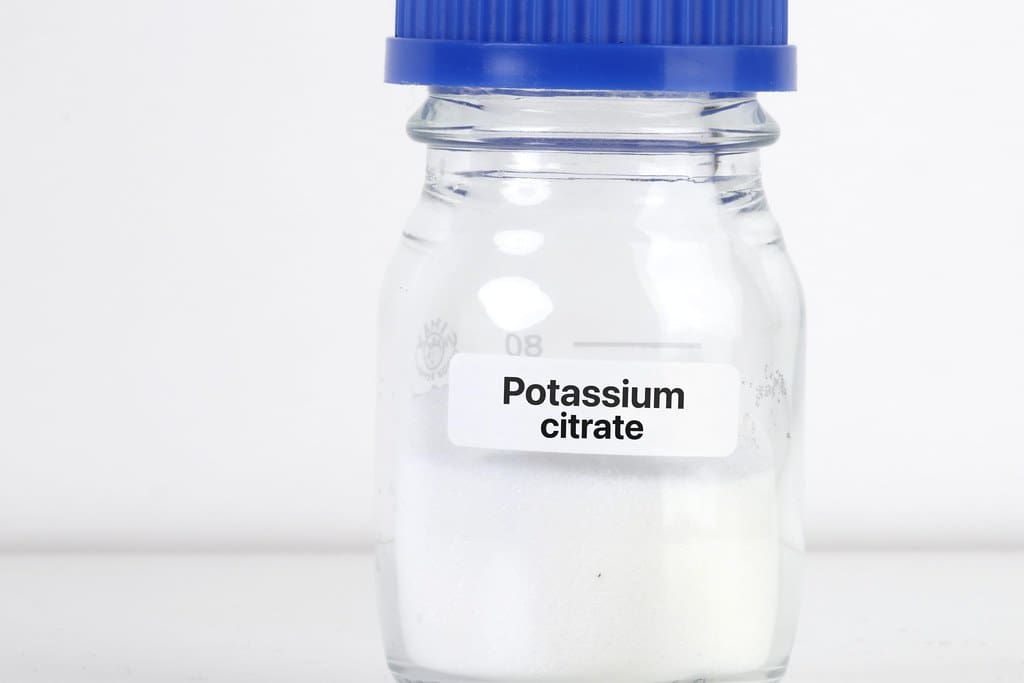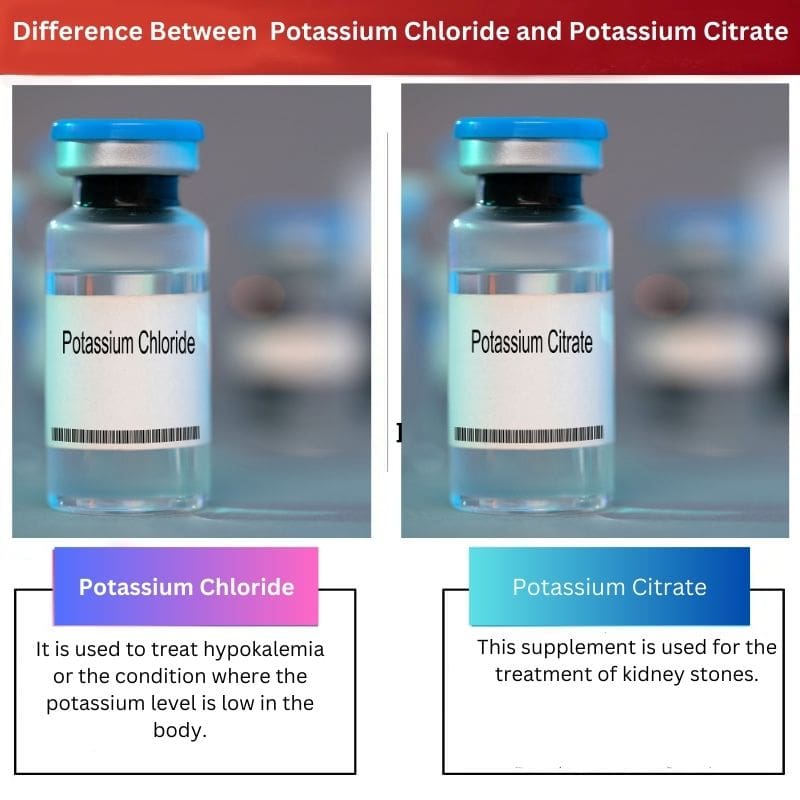Potassium is an essential mineral that helps our nerves muscles to function cells to absorb nutrients and extracts waste from body cells. Potassium chloride and potassium citrate are two forms of that mineral.
In the medical world, they are frequently prescribed but for different reasons, as they help to perform different functions in the human body.
Key Takeaways
- Potassium chloride is a salt used as a supplement to treat low potassium levels and as a salt substitute.
- Potassium citrate is a potassium salt of citric acid commonly used to treat kidney stones and acidosis.
- Both compounds serve specific medical purposes, but potassium citrate is more alkaline and has a different mechanism of action.
Potassium Chloride vs Potassium Citrate
Potassium chloride (KCl) is a chemical compound that consists of potassium and chlorine ions. It is a white crystalline solid with a salty taste and is commonly used as a salt substitute. Potassium citrate is a salt of potassium and citric acid. It is used as a dietary supplement.

If the level of potassium goes down in your body, potassium chloride is prescribed. It can be caused by a disease, medicine, improper diet or even medical conditions like diarrhoea.
It does not cost much and should only be consumed under medical supervision because it may cause severe side effects if overdosed.
Potassium citrate, on the other hand, is consumed to treat stones in the kidneys. This medical condition can be caused by the presence of uric acid or calcium in excessive amounts in the blood.
But it may happen due to consumption of junk food medicines, or even it can be genetic.
Comparison Table
| Parameters of Comparison | Potassium Chloride | Potassium Citrate |
|---|---|---|
| Formula | KCI | C6H5K307 |
| Disease | It is used to treat hypokalemia or the condition where the potassium level is low in the body. | This supplement is used for the treatment of kidney stones. |
| Medical issues | Consumption of this medicine may cause vomiting, acidity, upset stomach. | Its consumption can trigger weakness in the body, abdominal pain, vomiting etc. |
| Forms | Potassium chloride is available in both forms- tablets or pills and oral solution. | Potassium citrate is only available in tablet or pill form. It cannot be consumed orally. |
| Instruction of consumption | Potassium chloride should be taken with any form of liquid like water, juice etc. | Potassium citrate, on the other hand, is better to be consumed with a meal. |
What is Potassium Chloride?
Potassium Chloride is a type of medication used to treat hypokalemia or low potassium level in the human body.
If you are recently experiencing loss of appetite, nausea, weakness in muscles, abnormal heartbeats or even upset stomach. All these symptoms indicate that your potassium level is low.
This medication has various side effects. It can cause issues in the stomach, abdominal pain, nausea, tendency of vomiting, acidity etc. Sometimes it even raises the potassium level in your body, which is called hyperkalemia.
So the consumption of this medicine should strictly be done according to the prescribed doses of the doctor.
Potassium chloride is taken in capsule form, and it does not cost much to buy. It is taken by mouth and either with meals or an empty stomach. But it is advised to take with water or a glass of juice to avoid acidity or gas.
It is also used as an alternative to regular salt but tastes very bitter less flavoursome. So it is mixed with normal salt before use so that its taste improves.
It can be produced out of a lot of sources like potash, saltwater, carnalite and often, the method of crystallization is used.

What is Potassium Citrate?
Potassium citrate is prescribed to extract stones from the kidneys of the body. It is caused by the higher presence of uric acid in the blood.
This medical condition happens mainly due to a few causes like consumption of junk food, medicines or even a disease.
It is advised to consume potassium citrate after a meal or full stomach. Taking it by mouth on an empty stomach may cause problems in the body.
Due to this medical condition, your doctor may ask you to decrease the intake of potassium and increase the consumption of natural fluids in the body.
Buying one strip of potassium citrate pills does not cost much. However, the consumption of this medicine may trigger or cause a few issues in your body, such as the tendency to vomit, weakness, severe pain in the abdomen, etc.
So it is better to discuss with your doctor before starting the course.
Apart from treating kidney stones, potassium citrate pills are used in the treatment of heart diseases, diabetes, hypertension, diarrhoea etc.
There are certain rules that need to follow while consuming the potassium citrate pills, like taking them with a meal, lying down immediately after consumption and avoiding food products that are high in sodium and potassium.

Main Differences Between Potassium Chloride and Potassium Citrate
- Potassium chloride tablets are prescribed to treat low potassium levels in the human body, and potassium citrate is for treating mainly kidney stones.
- The consumption of potassium chloride pills may cause issues like vomiting, acidity, upset stomach. The side effects of potassium citrate are weakness in the body, abdominal pain, vomiting etc.
- Potassium chloride is available in both liquid and pill forms. But potassium citrate tablets are only available in the market.
- Potassium chloride should be taken with water or juice. But potassium citrate should be consumed with a meal.
- The formula of potassium chloride is KCI. C6H5K307 is the formula of potassium citrate.




